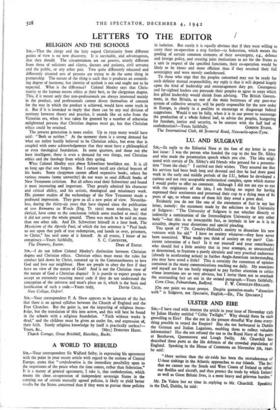A WORLD TO REBUILD
SIR,—Your correspondent Sir Watford Selby, in expressing his agreement with the point in your recent article with regard to the nations of Central Europe, states that " confederation is the immediate possibility open to the negotiators of the peace when the time comes, rather than federation." It is a matter of general agreement, I take it, that confederation, which means the close, co-operation of independent sovereign States in the carrying out of certain mutually agreed policies, is likely to yield better results for the States concerned than if they were to pursue those policies in isolation. But surely it is equally obvious that if they were willing to carry their co-operation a step further—to federation, which means the pooling of certain common elements of their sovereignty, e.g., defence and foreign policy, and creating joint institutions to act for the States as a unit in respect of the specified functions, their co-operation would be likely to be closer and more efficient than if they retained their full sovereignty and were merely confederated.
To those who urge that the peoples concerned may not be ready for such definite mutual responsibility, my reply is that it will depend largely upon the kind of leadership and encouragement they get. Courageous and far-sighted leaders can persuade their peoples to agree to steps which less gifted leadership would shrink from advising. The British Govern- ment, in that Britain, as one of the main buttresses of any post-war system of collective security, will be partly responsible for the new order in Europe, is clearly in a position to encourage or discpurage federal suggestions. Would it not be folly, when it is in our power to encourage the production of a whole federal loaf, to advise the peoples, hungering for freedom, justice and security, to be content with the half loaf of


























 Previous page
Previous page